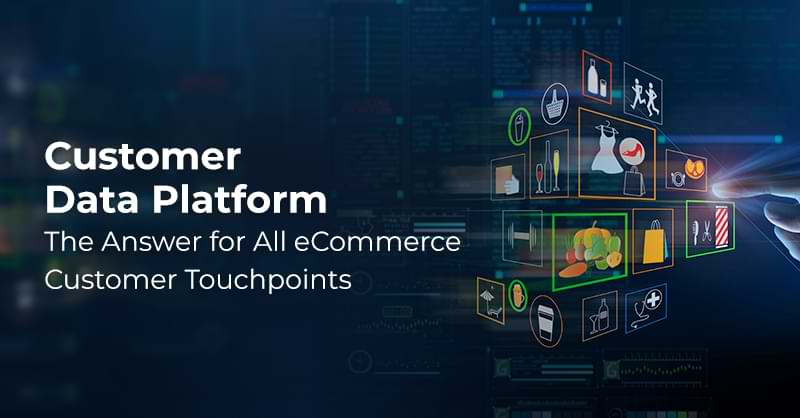Customer Data Platform: The Answer for All eCommerce Customer Touchpoints

Written by Shraddha Vikas Naik
Junior Business Analyst
November 7, 2022
With a booming eCommerce industry, customer data plays a significant role in targeted and customized marketing. Presently, customers generate significant data and digital footprints than ever before. Customer digital footprints are present everywhere – location-based, geographical, financial, behavioural data, ad impressions, purchases, and product usage.
Customer Data is accumulated in following ways:
- Direct inquiries with customers
- Indirect tracking of customer journey
- Using other sources such as surveys, competitions, etc.
A Customer Data Platform (CDP) is an integrated, prebuilt software system that provides a unified method for to build 360-degree customer profiles, which are essential prerequisites in today’s hyper-personalized customer experience era. CDP helps to bridge the gap between customers and businesses by understanding the needs and wants of both.
A Customer Data Platform is an integral part of the tech stack for all modern-day businesses across sectors, irrespective of their business objectives. It consists of features and functionality to access and analyze customer data in real-time, which is critical for business success— it is no wonder that customer data platforms are riding the eCommerce wave to new heights. In short, a CDP is strategically essential for any organization to unify customer sales, marketing, and service data to establish secure, reliable, timely, and high-quality customer data.
Customers may hesitate to reveal their personal information as they think it would be compromised or revealed to third parties without their consent. Access to customer data such as personal data, gender, age, location, interactions via apps and websites, campaign visits, and financial transaction data can lead to Data Privacy issues. A major concern for customers includes data protection and privacy concerns, such as unauthorized access to personal information, reuse of customer data, or unlawful transfer of private information to other parties.
Why Customer Data Platform?
When interacting with a brand or business, every customer leaves a digital footprint behind. These footprints can be tracked when they communicate with businesses through online and offline channels such as websites, eCommerce platforms, and in-store interactions. Businesses can organize and manage customer data professionally using a CDP platform. Instead of relying on spreadsheets and hand-drawn maps, CDP platforms are easy to use and help to drive business growth.
How is a Customer Data Platform distinct from other platforms, such as CRM?
- A CDP collects information about anonymous customers, whereas platforms like CRM collect data about known customers or leads.
- A CRM explores the sales pipeline, whereas a CDP analyses the lifetime customer behaviours and journeys.
- A CDP is a completely automated platform that tracks online and offline customer data. A CRM, for example, cannot collect offline data unless it is manually received.
- The data retention capacity of CDP platforms is more than that of CRM platforms.
Benefits of a Customer Data Platform
CDP is a Software-as-a-Service (SaaS) solution that not only assists businesses in understanding customer journeys and behaviours but also helps them engage and retain customers. It also helps to boost sales, enhance customer experiences, reduce operational costs, and expand the business by providing a wealth of meaningful insights.
Real-Time Data Collection with Maximum Accuracy
With the help of CDP platforms, you can collect real-time data from customers, which are provided to businesses through online forms, surveys, and feedback. Furthermore, you can easily track data such as purchases, return visits, revenue generated from online advertising, and additional competitive research.
Strategic Data Analytics
Businesses get refined and informative data with the help of a CDP. For example, tracking customer journeys and workflow automation reminders when the cart is abandoned by sending an email, text message, or WhatsApp message.
Effective Communication
CDP also provides targeted and personalized communication. For example, you can use data to predict when your customers are most likely to leave and send them targeted emails. You can also create products and services based on your customer preferences, thereby assisting you in upselling and boosting sales.
Save Time and Enhance Efficiency
A CDP automates most functions, such as data analysis function, thereby saving time and increasing efficiency.
Different Types of CDP Platforms
CDPs have developed over the years. CDP vendors offer either a comprehensive, all-in-one platform or a task-specific platform. Businesses can choose a CDP based on their business needs and goals. Some of the main types of CDP platforms include:
Trade Analytics
The Trade Analytics CDP helps businesses monitor customer behaviours and provide insights such as brand inclination, buying and usage patterns, etc.
Marketing Automation
The Marketing Automation CDP assists businesses in automating marketing campaign processes such as email marketing, social media marketing, and Search Engine Optimization. It is a superior version of the Trade Analytics platform.
Customer Support
The Customer Support CDP ensures the customer support team handles customer queries and supports issues efficiently.
How can you select the ideal CDP for your business?
Choosing a CDP for your company is a challenging process. There are numerous options available in the market, and picking the best one of them all can prove to be difficult. However, there are some integral steps businesses must consider while choosing a CDP:
Involve Stakeholders
Businesses need to think about the internal stakeholders, including the various departments or people who will use, analyze, and process the data received from a CDP. Every stakeholder doesn’t need to evaluate the tool independently, but you will need their feedback on various aspects before deciding on a CDP.
Reasons for Using CDP
Analyze why your business needs a CDP and talk to the stakeholders about what kind of benefits they want to derive from the CDP. Then prioritize and list the data needed to enhance the customer experience.
Select the Platforms, Technology, Tools
Find the tools that you want to connect with CDP to gather the data. Also, list the tools with which your customers interact, for example, website tools, CRM systems, real-time live chat, payment processors, email platforms, etc.
Gather Requirement
A detailed requirement gathering is necessary before selecting any CDP tool. Based on the information collected from different stakeholders and analyzing the business requirements, list what other functions the company expects to get from the CDP platform. For example, you might see that one CDP provides an end-to-end customer journey while another doesn’t. If a complete customer journey is required, you might want to make it a requirement.
Vendor Selection
Depending on the requirements, budget, and features provided by the vendor, you can compare different vendors before finalization.
Why Choose Royal Cyber?
Royal Cyber has partnered with brands such as Segment, Tealium, Optimizely, Bloomreach, Adobe, etc. Our CXM consultants and data scientists work with you to transform your company into a customer-centric giant. We propose solutions to deliver the best-in-class services to implement a customized customer data platform through an in-depth complimentary Martech assessment, empowering you to make the most of your customer data. Connect with us for more information.
Recent Blogs
- Middleware is often considered the glue that binds different systems and connecting platforms, and it …Read More »
- Learn to write effective test cases. Master best practices, templates, and tips to enhance software …Read More »
- In today’s fast-paced digital landscape, seamless data integration is crucial for businessRead More »



